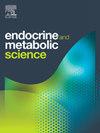Exploring the role of adipose tissue-derived hormones asprosin and leptin in the onset of depressive symptoms in newly diagnosed prediabetic individuals
Q3 Medicine
引用次数: 0
Abstract
Background
Type 2 diabetes and depression are common chronic conditions that often co-occur, likely driven by complex mechanisms that are not yet fully understood. Chronic low-grade inflammation may serve as a shared underlying factor in both conditions. This study aimed to determine whether adipose tissue-derived hormones asprosin and leptin, particularly asprosin, which is associated with inflammatory cytokines in glucose metabolism dysregulation and has not been studied in this context—might influence the onset of depressive symptoms.
Methods
112 participants were recruited from drug-naïve individuals. Blood samples were collected, anthropometric data recorded, the Beck Depression/Anxiety Inventories administered. Adapted questions assessed physical and social activity, as well as sleep habits, to account for environmental factors. After applying the exclusion criteria, participants were divided into prediabetic (n = 32) and normoglycemic groups (n = 30).
Results
In the prediabetic group CRP was elevated (p < 0.001), with a positive correlation between asprosin and leptin (p < 0.001). Asprosin was positively correlated with TNF-α (p = 0.004), IL-6 (p = 0.002), and ESR (p < 0.001), and leptin with TNF-α (p = 0.008) and ESR (p = 0.018) but not with depressive symptoms or anxiety. Depressive symptoms were higher in prediabetic individuals with poor sleep quality.
Conclusion
In groups with similar social and physical activity levels, poor sleep quality was associated with increased depressive symptoms. While asprosin and leptin correlated with higher inflammatory cytokines, they showed no significant association with depression, possibly due to the small sample size and early-stage evaluation. Larger studies are needed to confirm any potential link between these hormones and depression.
探讨脂肪组织源性激素阿泌素和瘦素在新诊断的糖尿病前期个体抑郁症状发作中的作用
背景2型糖尿病和抑郁症是常见的慢性疾病,经常同时发生,可能由尚未完全了解的复杂机制驱动。慢性低度炎症可能是这两种情况的共同潜在因素。本研究旨在确定脂肪组织来源的激素阿泌素和瘦素,特别是与糖代谢失调中的炎症细胞因子相关的阿泌素,是否可能影响抑郁症状的发生,但尚未在此背景下进行研究。方法从drug-naïve中招募112名受试者。采集血液样本,记录人体测量数据,进行贝克抑郁/焦虑量表。适应性问题评估了身体和社会活动,以及睡眠习惯,以解释环境因素。应用排除标准后,将参与者分为糖尿病前期组(n = 32)和血糖正常组(n = 30)。结果糖尿病前期组CRP升高(p <;0.001),肝球蛋白与瘦素呈正相关(p <;0.001)。Asprosin与TNF-α (p = 0.004)、IL-6 (p = 0.002)、ESR (p <;0.001),瘦素与TNF-α (p = 0.008)和ESR (p = 0.018)有关,但与抑郁症状或焦虑无关。睡眠质量差的糖尿病前期患者抑郁症状更高。结论在社交和体力活动水平相似的人群中,睡眠质量差与抑郁症状增加有关。虽然asprosin和leptin与较高的炎症细胞因子相关,但它们与抑郁症没有显着关联,可能是由于样本量小和早期评估。需要更大规模的研究来证实这些激素和抑郁症之间的潜在联系。
本文章由计算机程序翻译,如有差异,请以英文原文为准。
求助全文
约1分钟内获得全文
求助全文
来源期刊

Endocrine and Metabolic Science
Medicine-Endocrinology, Diabetes and Metabolism
CiteScore
2.80
自引率
0.00%
发文量
4
审稿时长
84 days
 求助内容:
求助内容: 应助结果提醒方式:
应助结果提醒方式:


